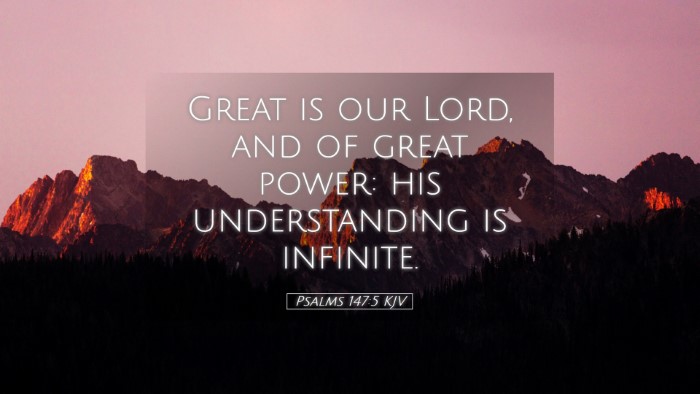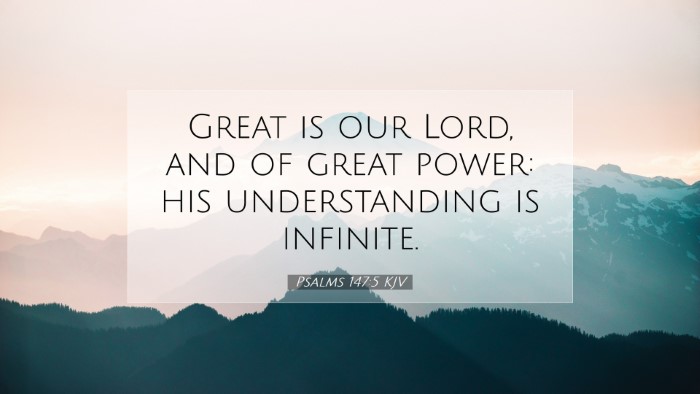Psalms 147:5 - Commentary
Bible Verse: "Great is our Lord, and of great power: his understanding is infinite."
This verse serves as a proclamation of the greatness and omnipotence of God. The psalmist emphasizes two key attributes of God: His immense power and His boundless understanding. Let us delve into the insights from various public domain commentaries to expand our understanding of this profound scripture.
1. The Greatness of the Lord
Matthew Henry: Henry emphasizes that the phrase "Great is our Lord" signifies not only His supremacy but also the magnitude of His attributes. He points out that this greatness encompasses His majesty, truth, and glory, making Him worthy of worship and adoration. Henry notes that acknowledging the greatness of God should invoke reverence and a sense of humility in the believer.
Albert Barnes: Barnes elaborates on the concept of God's greatness by pointing out how it particularly manifests in His works of creation and providence. He suggests that the natural world and its complexities reflect God's glorious power. According to Barnes, contemplating God's activities in history reinforces our understanding of His greatness.
Adam Clarke: Clarke offers insights into how the greatness of God provides comfort to believers. He posits that if God is so great, then He possesses the power to manage our lives and the world around us efficiently. Clarke draws attention to the idea that this greatness assures us of God's ability to hear and respond to our prayers.
2. The Power of God
Matthew Henry: Concerning God's "great power," Henry explains that this power is evident in its creative force and sustaining nature. God’s power is not merely abstract; it is demonstrated in the grandeur of creation and the ongoing renewal of life. This serves to remind us that God governs the universe with authority and strength.
Albert Barnes: Barnes asserts that God's power is unmatched, unlike earthly rulers and authorities. He highlights how God's interventions throughout biblical history, from the parting of the Red Sea to the resurrection of Christ, exemplify His sovereign control over nature and humanity. Barnes urges believers to trust in this divine power during life's trials.
Adam Clarke: Clarke reflects on the implications of God's power for human beings. He notes that the power of God should instill within us a sense of security. Since God is immensely powerful, believers are reassured that nothing is beyond His capability, whether it concerns their personal struggles or global issues.
3. The Infinite Understanding of God
Matthew Henry: Henry defines God’s understanding as His infinite wisdom, which surpasses human comprehension. He emphasizes that God not only knows everything but understands the intricacies of every situation. This infinite understanding means that God’s judgment is devoid of error and full of righteousness.
Albert Barnes: Barnes discusses the implications of God’s infinite understanding on our prayer life and relationship with Him. He emphasizes that God knows our needs before we voice them, and therefore, our prayers are not mere requests but acts of faith acknowledging His sovereignty and understanding. This, he argues, invites a deeper connection between God and humanity.
Adam Clarke: Clarke points out that God's infinite understanding allows Him to comprehend not only the external actions of men but also their thoughts and intents. This infinite knowledge implies that God is fully aware of both the inner struggles and the external circumstances faced by individuals, thus comforting believers that God empathizes with their plight.
4. Application for Believers
The insights gained from Psalms 147:5 prompt several applications for the lives of believers:
- Worship: Recognizing the greatness of God encourages heartfelt worship. Believers are reminded of the splendor and majesty that should be reflected in their approach to God.
- Trust: Understanding God's omnipotence and infinite understanding fosters trust. In trials, believers can rest assured that God is in control and is fully aware of their circumstances.
- Prayer: The infinite wisdom of God should encourage a posture of reliance in prayer. Believers are invited to approach God confidently, knowing He is fully capable of providing what they need.
- Community: Recognizing God's greatness can unify believers in worship and purpose, as they collectively strive to reflect His attributes in their daily lives.
5. Conclusion
Psalms 147:5 encapsulates powerful truths about God's character. Great is our Lord; His power is immensely transformative, and His understanding is intimately personal. As we reflect on this verse, may we grow in awe of God's magnificence and deepen our relationship with Him, recognizing that we are in the hands of an all-powerful and all-knowing Creator.


